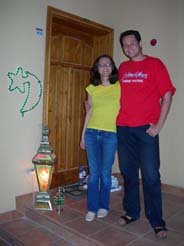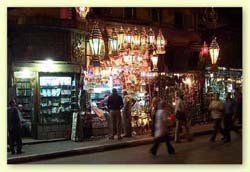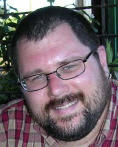 I thought that someone who is Muslim would be able to tell people about Ramadan better than I. I asked Nelly, who is a Muslim, Egyptian, my neighbor in the compound and works for the Georgetown School of Foreign Service to write something for my blog. I told her that I would take pictures of her Ramadan lanterns and post her story.
I thought that someone who is Muslim would be able to tell people about Ramadan better than I. I asked Nelly, who is a Muslim, Egyptian, my neighbor in the compound and works for the Georgetown School of Foreign Service to write something for my blog. I told her that I would take pictures of her Ramadan lanterns and post her story.
Nelly and her husband Sherif in front of their home
RAMADAN IN EGYPT BY NELLY EL ZAYAT
Ramadan gaana we frehnaaboh ba’d gheyaabo.
Ahlan Ramadan, Ramadan gaana.
Ramadan has come to us and we are happy with it after its absence.
Welcome Ramadan, Ramadan has come to us!
These are the words to one of the many Ramadan songs that every Egyptian and many Arabs know off by heart since childhood. The familiar tune begins playing on that night in Sha’ban when the Mufti (the most senior Islamic scholar who issues the fatwas (the religious interpretation or legal pronouncement in Islam)) announces that Ramadan is tomorrow or the day after. Sha’ban, like all lunar months, is either 29 or 30 days. While science today has enabled us to find out when the new moon will appear, it is still the tradition to actually check for the new moon on the twenty-ninth day of each lunar month. The lunar calendar begins with the month of Muharram followed by Safar, Rabie’ Al-Awwal, Rabie’Al-Thani, Jumadi Al-Awwel, Jumadi Al-Thani, Ragab, Sha’ban, Ramadan, Shawwal, Thu Al-Qe’da, Thu AlHiga. This calendar has an eleven-day offset from the Gregorian calendar and so Ramadan and all the other lunar months come eleven days earlier every year. For the past few years, Ramadan has been in the fall and it will slowly go back to the summer in the coming years.
Ramadan is the ninth month of the Islamic/lunar calendar and it is the one we all wait for in Egypt! The religious rituals in terms of fasting and praying are the same or very similar to those rituals practiced elsewhere in the Arab and Islamic worlds. Muslims fast from sunrise to sunset everyday during Ramadan unless they have a reason not to, like sickness or travel, for example. Fasting entails no eating, no drinking and no sexual intercourse from sunrise to sunset, and it is the fourth pillar of the five pillars of Islam. Ramadan is also a time of the year when Muslims are more dedicated to reading the Quran and to doing more prayers than the usual five prayers of the day. Ramadan’s holiness comes from the fact that Muslims believe that the first time Gabriel revealed verses of the Quran to the Prophet Mohammed was during that month.
The two main meals in Ramadan then are Iftar, which actually means breakfast. That meal is as soon as the sun sets and the Maghrib (sunset) prayer is called for. The other meal is Sohour (supper). Sohour has no fixed time, but it is a later meal. Some people wake up just before sunrise to have sohour. Others stay up late and eat before they go to bed. The main characteristic of Ramadan food lies in the delicious Ramadan desserts! Most of the Ramadan desserts (konafa, katayef, bassboussa, khoshaf and many others) are similar in that they are full of nuts and syrup. Despite the fact that most people fast in Ramadan, these desserts help many people gain a lot of weight!
The Egyptian social dimension of Ramadan is extremely unique and makes Ramadan a very special and festive time for the Egyptians-all of them, Muslims and Christians alike. This is the time of year when you are bound to reunite with everyone; family, friends, relatives, classmates, colleagues! There are two meals everyday and everyone makes sure that they are not having those two meals alone! The streets of Cairo are decorated with fawanees or lanterns. The fanoos seems to date back to Fatimid Cairo, around the tenth century AD, and has become associated with Ramadan. Most parents buy their children fanoos Ramadan and the children go around with their fawanees singing all the Ramadan traditional songs. Traditionally the fanoos was made of tin and colored glass with a candle inside. Today, there are electric lanterns, plastic lanterns, battery-operated lanterns that sing Ramadan songs and sometimes other songs too!
Ever since the establishment of the Egyptian Radio in the early 30’s, special programs and radio shows were aired in Ramadan. One of the most famous programs was the fawazeer meaning the riddles. A daily riddle was broadcast and usually all 29 or 30 riddles followed a particular theme. The listeners were supposed to find the answers to the riddles and send in their answers at the end of the month for prizes. Today, the Ramadan radio programs are still just as active and celebratory in Ramadan. But, of course, all those programs, soap operas, fawazeer and other shows were duplicated and improved when they moved to the television in 1960. Now, Ramadan has become associated with exclusive programs and good-quality drama. Everyone in Egypt follows the various programs and shows in Ramadan and most home-Iftars are followed by a gathering in front of the television!
A special Egyptian Ramadan feature that is also aired on the radio and on television is the Ramadan Cannon. Many centuries ago, a cannon near the Citadel in Cairo was fired at the time of sunset in Ramadan by mistake! Everyone at the time thought it was a signal that it was time to eat. Ever since, a cannon bullet is fired one second before the sunset call to prayer. And the famous, “Madfa’ Al-iftar, edrab” is heard meaning, “Cannon of Iftar, fire!” And believe it or not, the cannon that fired that bullet hundreds of years ago is the same one that fires a bullet everyday in Ramadan today! The Egyptians have nicknamed the cannon, Al-Hagga Fatma probably in relation to the Fatimids.
Sports also take a different shape during Ramadan in Egypt. Many tournaments especially football/soccer tournaments are organized throughout the month. Young, old, professionals and non-professionals all take part and the main pleasure is in participating and not in winning.
Beginning in the 1990s, Cairo, and soon after other Egyptian cities, witnessed what became another Ramadan tradition: Ma’edat Al-Rahman (the table of the All-Beneficent). The All Beneficent is one of the 99 names of God in Islam. Mawa’ed Al-Rahman (the plural form) are large tables that are set up everyday in Ramadan in different parts of the city, where generous amounts of food are served and anyone is welcome to come in and break their fast for free. These tables are organized and financed by the more wealthy members of society who offer this food as a form of charity for the poor who are fasting. In reality, however, anyone at all can walk up to a Ma’edat Rahman; if you are not poor, not fasting and not Muslim, you could still eat there! No one will stop you!
Everyday is a celebration in "Ramadanian Egypt." The day finally ends when everyone goes to bed. But not quite: at around 2 a.m. the messaharaty starts marching the streets of Egypt. The messaharaty is a man who usually possesses a strong voice and a little drum and beater. Essha ya nayem, wahhed el-dayem (wake up sleepers, pray to the One of all times), he would call out and sing. You could arrange with the messaharaty to call your own name and wake you up! The messaharaty does not have a fixed salary, but is paid through donations from people who enjoy hearing his calls and songs every night.
Comes the 29th day of Ramadan, we see the mufti on television again and we impatiently wait to find out if ‘Eid Al-Fitr (the feast of breaking the fast) or the beginning of the month of Shawwal is the following day or the day after. Then the radio and television begin to play:
Ramadan is the ninth month of the Islamic/lunar calendar and it is the one we all wait for in Egypt! The religious rituals in terms of fasting and praying are the same or very similar to those rituals practiced elsewhere in the Arab and Islamic worlds. Muslims fast from sunrise to sunset everyday during Ramadan unless they have a reason not to, like sickness or travel, for example. Fasting entails no eating, no drinking and no sexual intercourse from sunrise to sunset, and it is the fourth pillar of the five pillars of Islam. Ramadan is also a time of the year when Muslims are more dedicated to reading the Quran and to doing more prayers than the usual five prayers of the day. Ramadan’s holiness comes from the fact that Muslims believe that the first time Gabriel revealed verses of the Quran to the Prophet Mohammed was during that month.
The two main meals in Ramadan then are Iftar, which actually means breakfast. That meal is as soon as the sun sets and the Maghrib (sunset) prayer is called for. The other meal is Sohour (supper). Sohour has no fixed time, but it is a later meal. Some people wake up just before sunrise to have sohour. Others stay up late and eat before they go to bed. The main characteristic of Ramadan food lies in the delicious Ramadan desserts! Most of the Ramadan desserts (konafa, katayef, bassboussa, khoshaf and many others) are similar in that they are full of nuts and syrup. Despite the fact that most people fast in Ramadan, these desserts help many people gain a lot of weight!
The Egyptian social dimension of Ramadan is extremely unique and makes Ramadan a very special and festive time for the Egyptians-all of them, Muslims and Christians alike. This is the time of year when you are bound to reunite with everyone; family, friends, relatives, classmates, colleagues! There are two meals everyday and everyone makes sure that they are not having those two meals alone! The streets of Cairo are decorated with fawanees or lanterns. The fanoos seems to date back to Fatimid Cairo, around the tenth century AD, and has become associated with Ramadan. Most parents buy their children fanoos Ramadan and the children go around with their fawanees singing all the Ramadan traditional songs. Traditionally the fanoos was made of tin and colored glass with a candle inside. Today, there are electric lanterns, plastic lanterns, battery-operated lanterns that sing Ramadan songs and sometimes other songs too!
Ever since the establishment of the Egyptian Radio in the early 30’s, special programs and radio shows were aired in Ramadan. One of the most famous programs was the fawazeer meaning the riddles. A daily riddle was broadcast and usually all 29 or 30 riddles followed a particular theme. The listeners were supposed to find the answers to the riddles and send in their answers at the end of the month for prizes. Today, the Ramadan radio programs are still just as active and celebratory in Ramadan. But, of course, all those programs, soap operas, fawazeer and other shows were duplicated and improved when they moved to the television in 1960. Now, Ramadan has become associated with exclusive programs and good-quality drama. Everyone in Egypt follows the various programs and shows in Ramadan and most home-Iftars are followed by a gathering in front of the television!
A special Egyptian Ramadan feature that is also aired on the radio and on television is the Ramadan Cannon. Many centuries ago, a cannon near the Citadel in Cairo was fired at the time of sunset in Ramadan by mistake! Everyone at the time thought it was a signal that it was time to eat. Ever since, a cannon bullet is fired one second before the sunset call to prayer. And the famous, “Madfa’ Al-iftar, edrab” is heard meaning, “Cannon of Iftar, fire!” And believe it or not, the cannon that fired that bullet hundreds of years ago is the same one that fires a bullet everyday in Ramadan today! The Egyptians have nicknamed the cannon, Al-Hagga Fatma probably in relation to the Fatimids.
Sports also take a different shape during Ramadan in Egypt. Many tournaments especially football/soccer tournaments are organized throughout the month. Young, old, professionals and non-professionals all take part and the main pleasure is in participating and not in winning.
Beginning in the 1990s, Cairo, and soon after other Egyptian cities, witnessed what became another Ramadan tradition: Ma’edat Al-Rahman (the table of the All-Beneficent). The All Beneficent is one of the 99 names of God in Islam. Mawa’ed Al-Rahman (the plural form) are large tables that are set up everyday in Ramadan in different parts of the city, where generous amounts of food are served and anyone is welcome to come in and break their fast for free. These tables are organized and financed by the more wealthy members of society who offer this food as a form of charity for the poor who are fasting. In reality, however, anyone at all can walk up to a Ma’edat Rahman; if you are not poor, not fasting and not Muslim, you could still eat there! No one will stop you!
Everyday is a celebration in "Ramadanian Egypt." The day finally ends when everyone goes to bed. But not quite: at around 2 a.m. the messaharaty starts marching the streets of Egypt. The messaharaty is a man who usually possesses a strong voice and a little drum and beater. Essha ya nayem, wahhed el-dayem (wake up sleepers, pray to the One of all times), he would call out and sing. You could arrange with the messaharaty to call your own name and wake you up! The messaharaty does not have a fixed salary, but is paid through donations from people who enjoy hearing his calls and songs every night.
Comes the 29th day of Ramadan, we see the mufti on television again and we impatiently wait to find out if ‘Eid Al-Fitr (the feast of breaking the fast) or the beginning of the month of Shawwal is the following day or the day after. Then the radio and television begin to play:
Walla lessa badry badry
Ya Shahr El-Seyam
By God it’s too soon to leave us
Month of Fasting


1 comment:
Hey Nelly and Ed! What a fantastic idea! I have always wanted to know more about Ramadan. It plays an important role in Germany with our Turkish citizens. But I never knew much more than the fasting bit. Thanks especially for the songs/prayers you translated! Fantastic idea for the blog!
Post a Comment